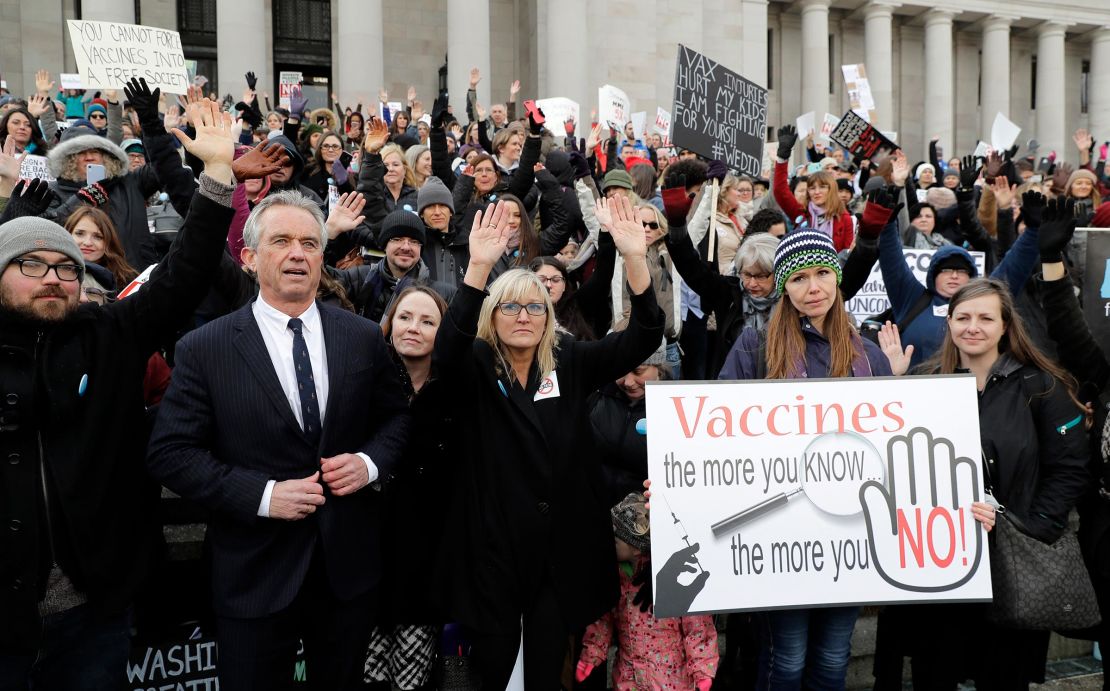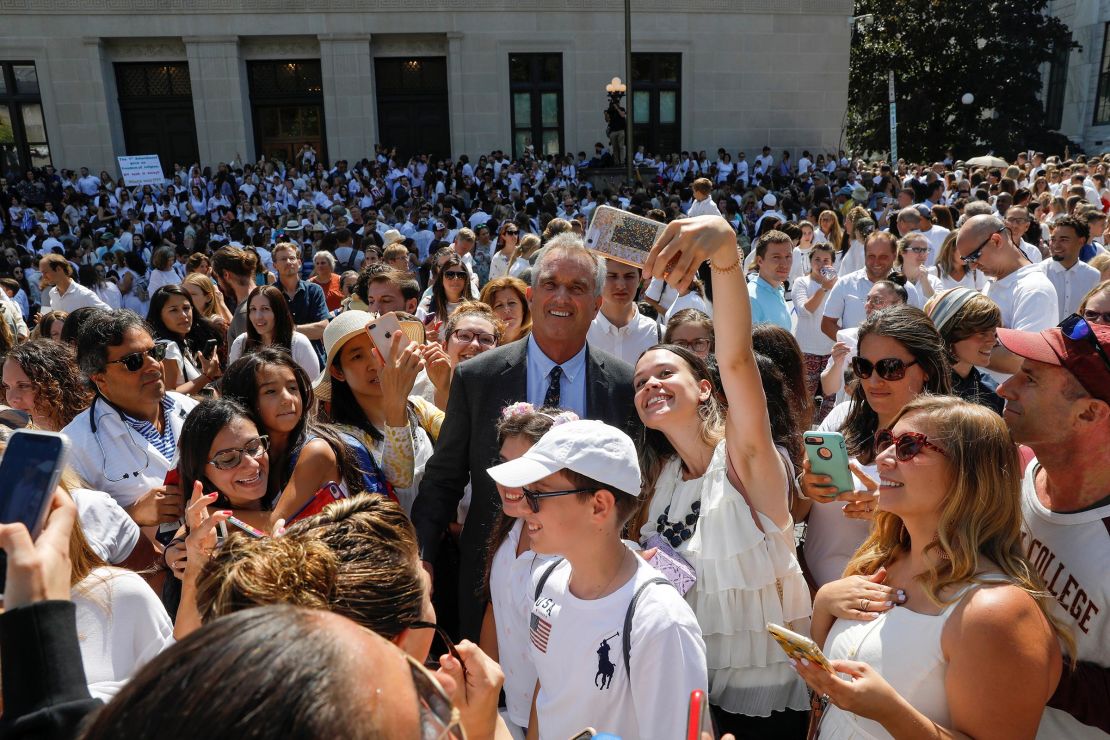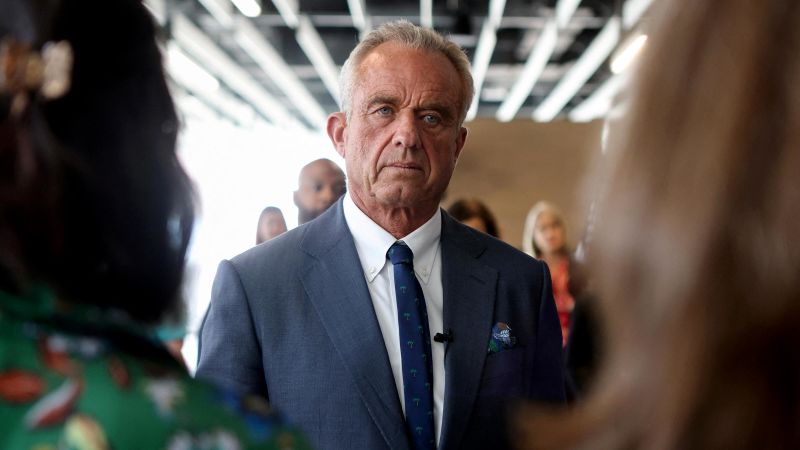CNN
—
Health and Human Services Secretary Robert F. Kennedy Jr. this week made his strongest endorsement yet of the measles vaccine amid an ongoing outbreak that has killed three and infected more than 600 people across the US.
But his recent push for people to get vaccinated for measles stands in stark contrast to Kennedy’s years of work against measles vaccines, including suing the state of New York for its vaccine mandates, and making numerous claims that the shot is dangerous and unnecessary.
Kennedy’s comments on X last Sunday that the measles-mumps-rubella (MMR) vaccine, “is the most effective way to prevent the spread of measles” set off vaccine critics who saw the statement as a betrayal of the health secretary’s longtime views on vaccine safety.
“Bobby Kennedy was our founder, but Bobby Kennedy is now the Secretary of HHS,” Mary Holland, CEO of the anti-vaccine group Children’s Health Defense, said in a video statement. “He certainly left off that in my personal experience, and in the personal experience of many people at CHD, the measles, mumps, rubella vaccine was extremely injurious.”
Holland went on to repeat disproven claims that the MMR vaccine causes autism.
The health secretary followed up this Thursday with a Fox News interview, where he told host Martha MacCallum that it is “very hard to tell” whether measles deaths this year could have been averted with vaccinations. “We need to do better at treating kids who have this disease, and not just saying the only answer is vaccination.”
He also discussed the health agency’s “massive research and testing” plan to find the causes of autism by this September, a project he said will probe vaccinations along with environmental exposures, food and societal factors.
While Kennedy has been most critical of Covid-19 vaccines in recent years, MMR immunizations have been one of his earliest and most consistent targets for misinformation and alarm over the last two decades.
CNN reached out to HHS for comment regarding Kennedy’s past and recent remarks on MMR vaccines.
As Kennedy wrote in his 2023 book with Brian Hooker, Vax-Unvax, “The MMR vaccine is the tip of the spear regarding the modern debate around vaccine safety.”
Here are three ways Kennedy questioned the vaccine’s safety and the severity of measles infections themselves.
The theory that MMR vaccines led to autism first took hold with a since-retracted 1998 study by Andrew Wakefield. As the disbarred British physician rose to prominence in the anti-vaccine world, so did Kennedy — who repeatedly defended his debunked research.
“Wakefield [and his co-researchers] did not state that MMR causes autism,” Kennedy and Hooker wrote in their 2023 book. “They merely pointed out the timing of the vaccine before the onset of symptoms.”
Ten of the 12 co-authors on the study issued a retraction in 2004, saying it established no causal link between the MMR shot and autism. Infants with autism typically start showing signs between 12-24 months of age; the first dose of the MMR vaccine is usually given when a child is 12 months old.
Kennedy, like Wakefield, has asserted over the years that MMR vaccines lead to myriad adverse events besides autism.
MMR vaccines have an “unconscionably high injury rate” Kennedy wrote on CHD’s website in 2019, citing gastrointestinal and respiratory complications from a mid-1970s study. Those are symptoms “that might persuade rational consumers to choose the infections over the vaccine,” he added.

This March, speaking to Fox News’ Sean Hannity, Kennedy repeated the claim that the vaccines themselves are as risky at the virus. “[The MMR vaccine] causes all the illnesses that measles itself causes,” and leads to “deaths every year,” he said.
There are no reported deaths from the vaccine among healthy people, according to the Infectious Disease Society of America.
Kennedy has repeatedly said that measles outbreaks are not unusual, infection is not severe in healthy people, and deaths with measles are due to other causes.
“If you look at the kids in Africa who die from measles, or these other infectious diseases, they’re all malnourished,” he said on Joe Rogan’s podcast in June 2023. “It’s hard for a disease to kill a healthy person; it’s hard for an infectious disease to kill a healthy person with a rugged immune system.”
State health departments reported no underlying health conditions reported in the three US deaths this year, the first measles deaths in the country in a decade. All three, two children in Texas and an adult in New Mexico, were unvaccinated. In the Fox interview Thursday, Kennedy suggested at least one of the children had prior medical complications.
Kennedy also this year dismissed the notion that many died from measles in a 2019 Samoan outbreak that killed 83 and infected more than 5,000 people.
Details of Kennedy’s visit to Samoa months before the 2019 outbreak resurfaced during his Senate confirmation hearings. He went to the country following an invitation from an anti-vaccine advocate, but denies he campaigned against vaccination while he was there. He also denied to senators that dozens of people died from the virus.
“Most of the people did not have measles,” when tissue samples were tested, he told Sen. Ron Wyden (D-Ore.) “We don’t know what was killing them.”
That claim is a “total fabrication,” Samoa Director-General of Health Dr. Alec Ekeroma told The Associated Press. Ekeroma also said Kennedy met with anti-vaccine advocates while there.
Kennedy, along with former federal prosecutor Michael Sussman, sued the state of New York in 2019 to oppose vaccine requirement for school-age children. The state’s legislature passed the law, which removed religious exemptions, amid a measles outbreak that year among Brooklyn’s Orthodox Jewish community that infected nearly 800 people.

A state Supreme Court justice rejected the suit days later. The Kennedy-chaired Children’s Health Defense vowed to keep fighting.
That same year, Kennedy rallied with Washington state residents against a MMR vaccine mandate for children attending school. At the time, there were roughly 50 reported measles cases in the state. It spread to 71 people, most of them unvaccinated children, during the monthslong outbreak.
As health secretary, Kennedy has maintained that position that vaccination should be a choice despite the spread of measles across 23 states.
“The federal government’s position, my position, is that people should get the measles vaccine, but the government should not be mandating those,” Kennedy told CBS News April 8. “I always said during my campaign — and every part, every public statement I’ve made — I’m not gonna take people’s vaccines away from them. What I’m gonna do is make sure that we have good science so that people can make an informed choice.”

